Strategic Marketing Analysis of Yorkshire Tea Company
VerifiedAdded on 2023/06/13
|15
|1057
|320
AI Summary
This report provides a strategic marketing analysis of Yorkshire Tea Company, including market size and trend data, PESTLE analysis, SWOT analysis, Porter's Five Forces, customer analysis, stakeholder analysis, and a marketing plan.
Contribute Materials
Your contribution can guide someone’s learning journey. Share your
documents today.

Strategic Marketing
Secure Best Marks with AI Grader
Need help grading? Try our AI Grader for instant feedback on your assignments.
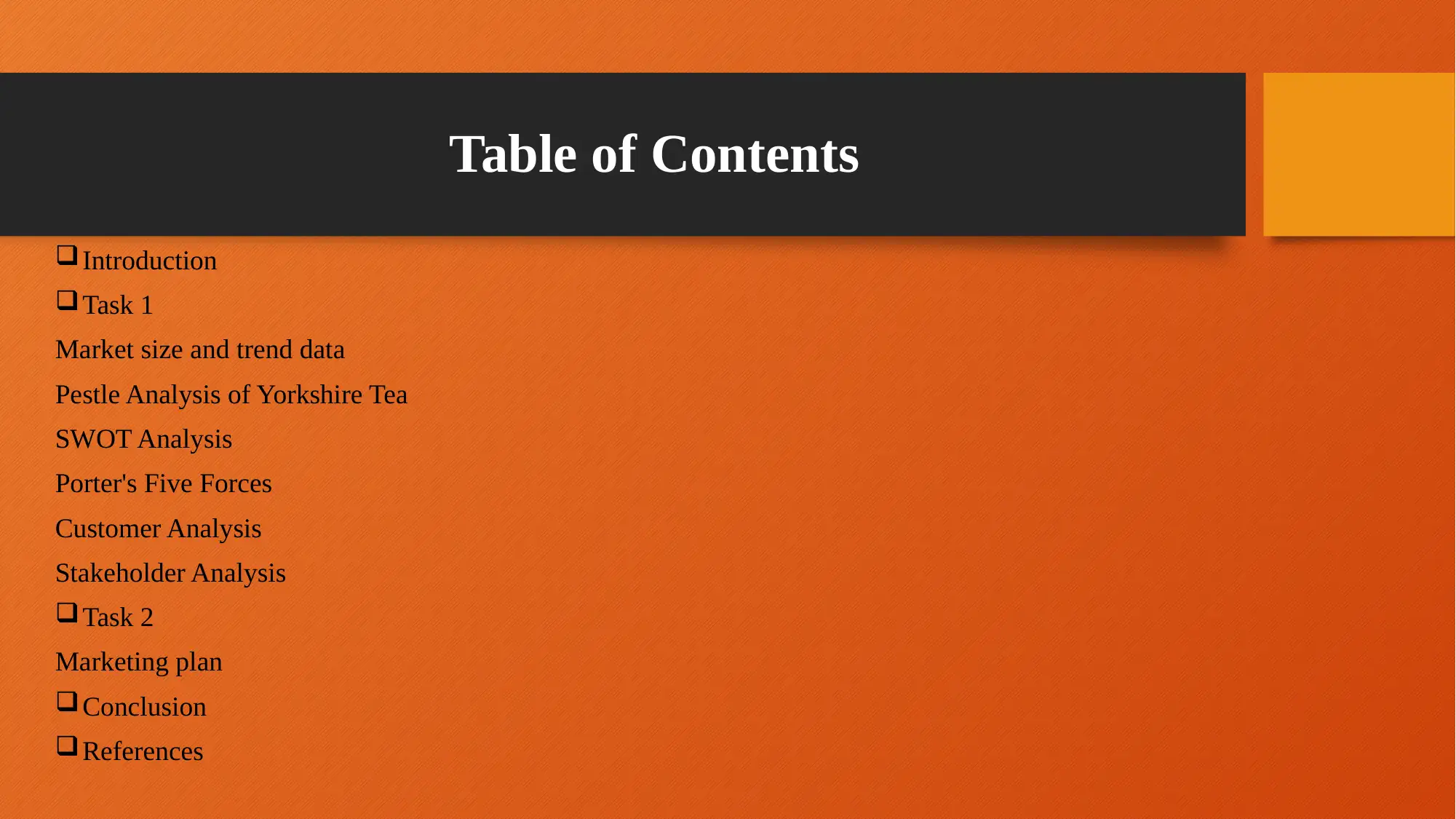
Table of Contents
Introduction
Task 1
Market size and trend data
Pestle Analysis of Yorkshire Tea
SWOT Analysis
Porter's Five Forces
Customer Analysis
Stakeholder Analysis
Task 2
Marketing plan
Conclusion
References
Introduction
Task 1
Market size and trend data
Pestle Analysis of Yorkshire Tea
SWOT Analysis
Porter's Five Forces
Customer Analysis
Stakeholder Analysis
Task 2
Marketing plan
Conclusion
References
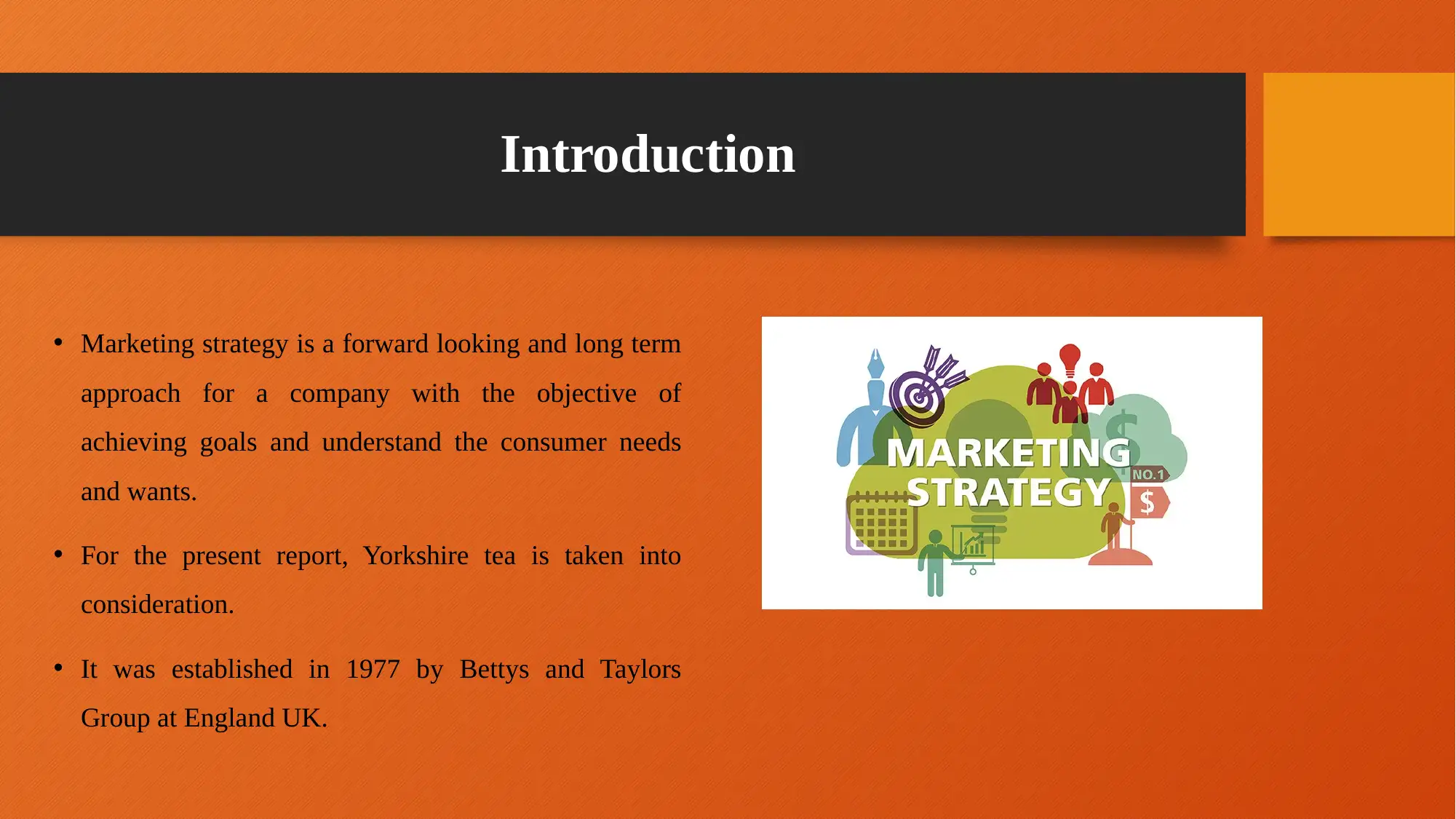
Introduction
• Marketing strategy is a forward looking and long term
approach for a company with the objective of
achieving goals and understand the consumer needs
and wants.
• For the present report, Yorkshire tea is taken into
consideration.
• It was established in 1977 by Bettys and Taylors
Group at England UK.
• Marketing strategy is a forward looking and long term
approach for a company with the objective of
achieving goals and understand the consumer needs
and wants.
• For the present report, Yorkshire tea is taken into
consideration.
• It was established in 1977 by Bettys and Taylors
Group at England UK.
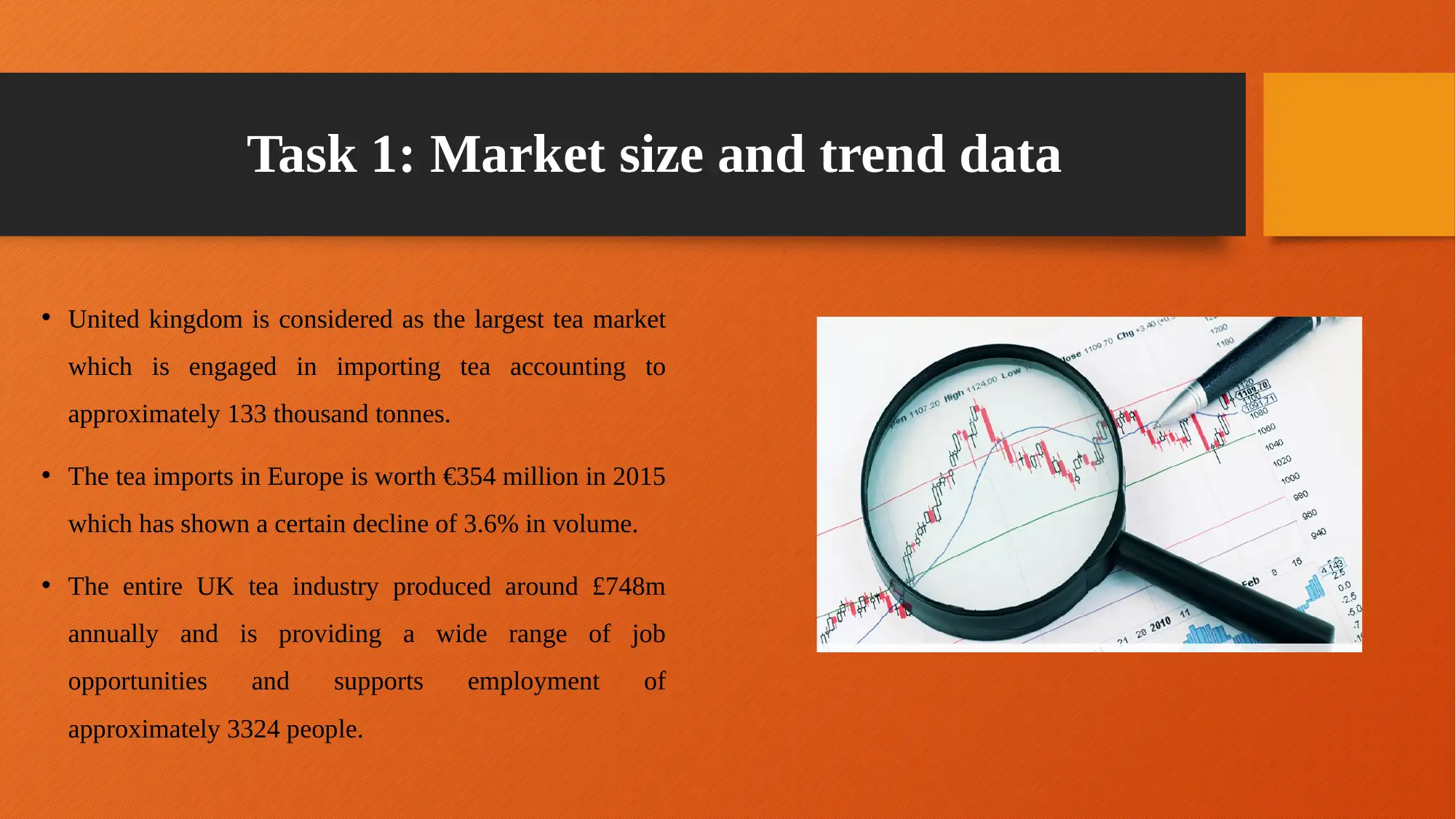
Task 1: Market size and trend data
• United kingdom is considered as the largest tea market
which is engaged in importing tea accounting to
approximately 133 thousand tonnes.
• The tea imports in Europe is worth €354 million in 2015
which has shown a certain decline of 3.6% in volume.
• The entire UK tea industry produced around £748m
annually and is providing a wide range of job
opportunities and supports employment of
approximately 3324 people.
• United kingdom is considered as the largest tea market
which is engaged in importing tea accounting to
approximately 133 thousand tonnes.
• The tea imports in Europe is worth €354 million in 2015
which has shown a certain decline of 3.6% in volume.
• The entire UK tea industry produced around £748m
annually and is providing a wide range of job
opportunities and supports employment of
approximately 3324 people.
Secure Best Marks with AI Grader
Need help grading? Try our AI Grader for instant feedback on your assignments.
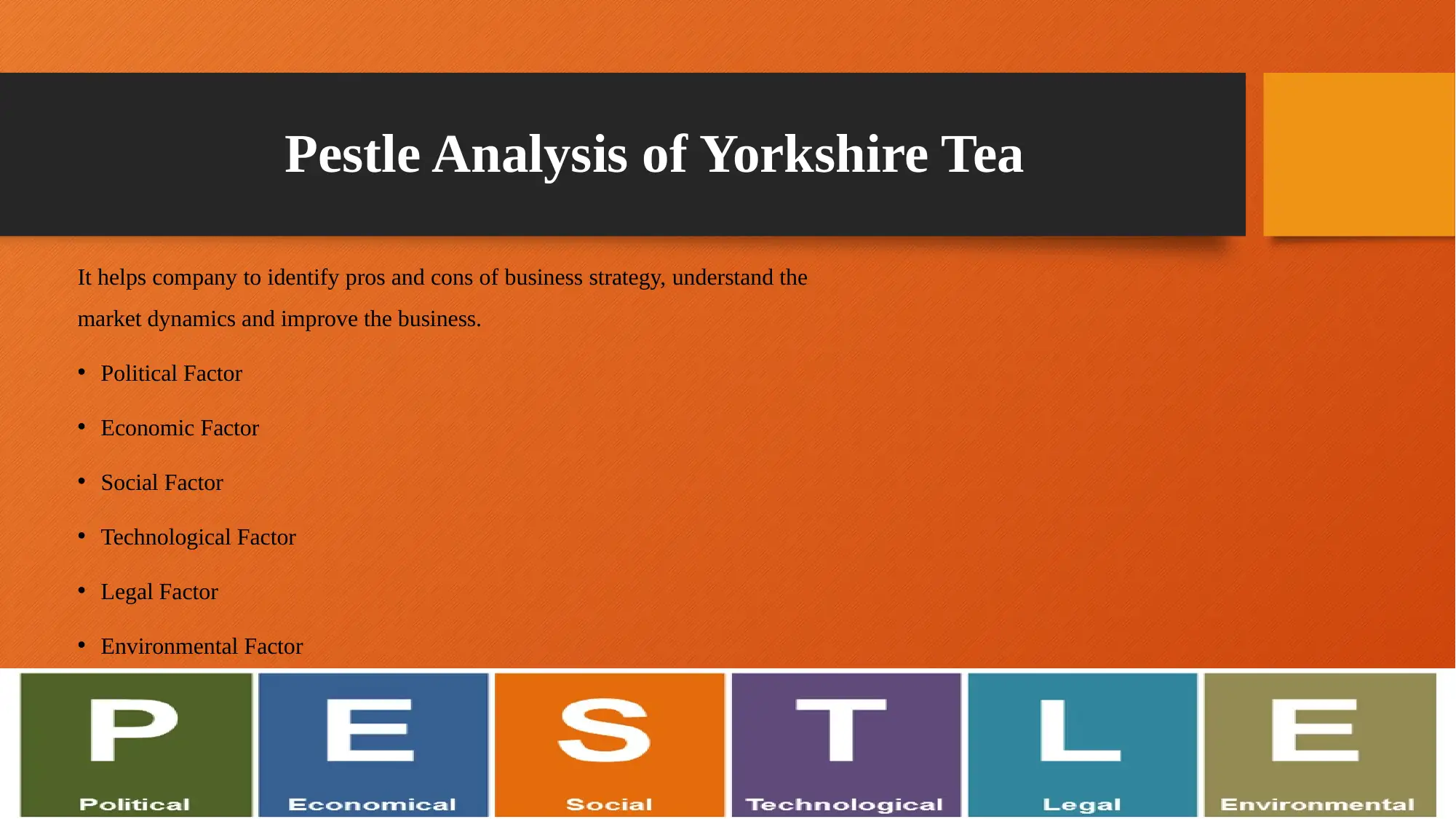
Pestle Analysis of Yorkshire Tea
It helps company to identify pros and cons of business strategy, understand the
market dynamics and improve the business.
• Political Factor
• Economic Factor
• Social Factor
• Technological Factor
• Legal Factor
• Environmental Factor
It helps company to identify pros and cons of business strategy, understand the
market dynamics and improve the business.
• Political Factor
• Economic Factor
• Social Factor
• Technological Factor
• Legal Factor
• Environmental Factor
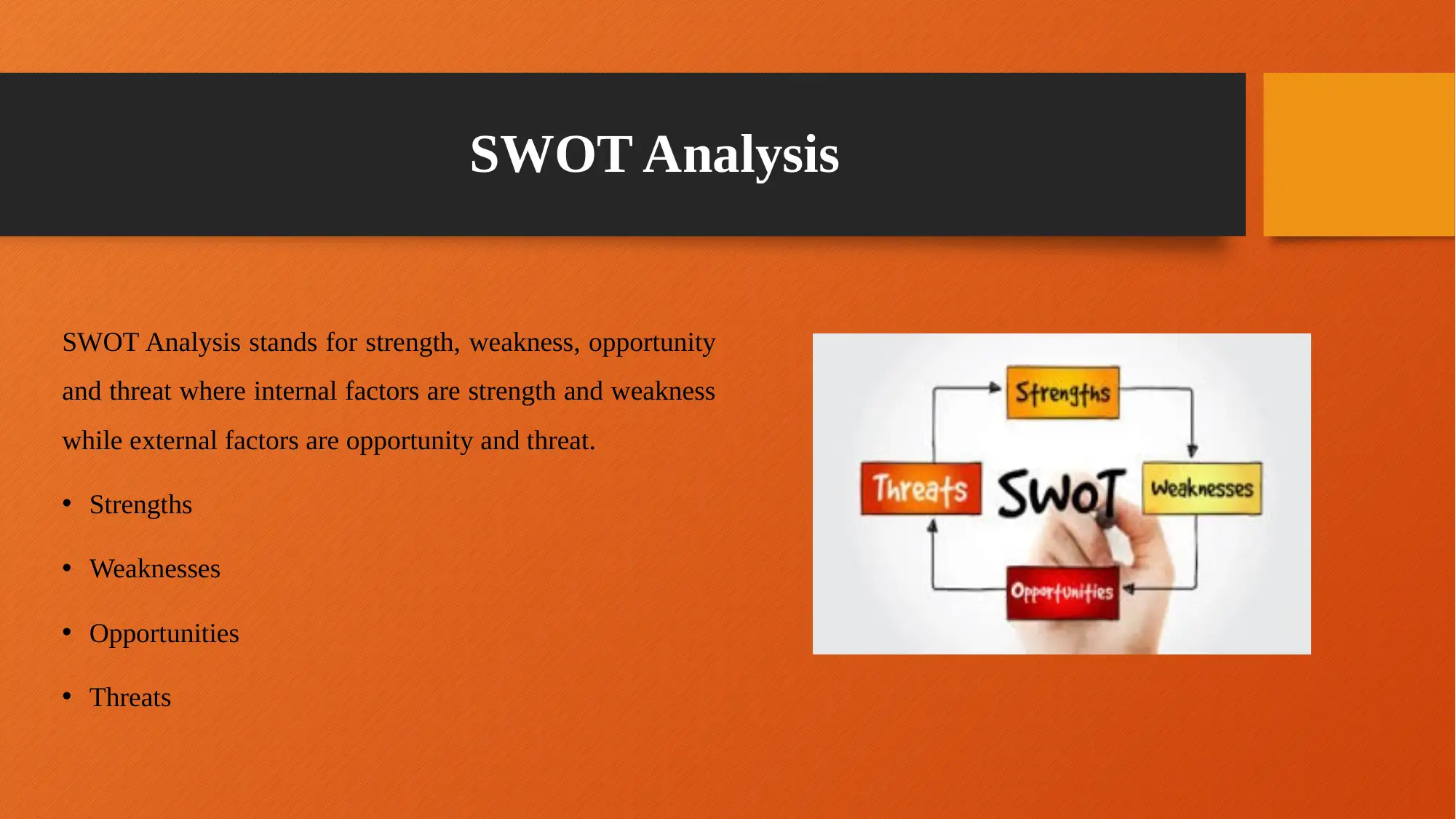
SWOT Analysis
SWOT Analysis stands for strength, weakness, opportunity
and threat where internal factors are strength and weakness
while external factors are opportunity and threat.
• Strengths
• Weaknesses
• Opportunities
• Threats
SWOT Analysis stands for strength, weakness, opportunity
and threat where internal factors are strength and weakness
while external factors are opportunity and threat.
• Strengths
• Weaknesses
• Opportunities
• Threats
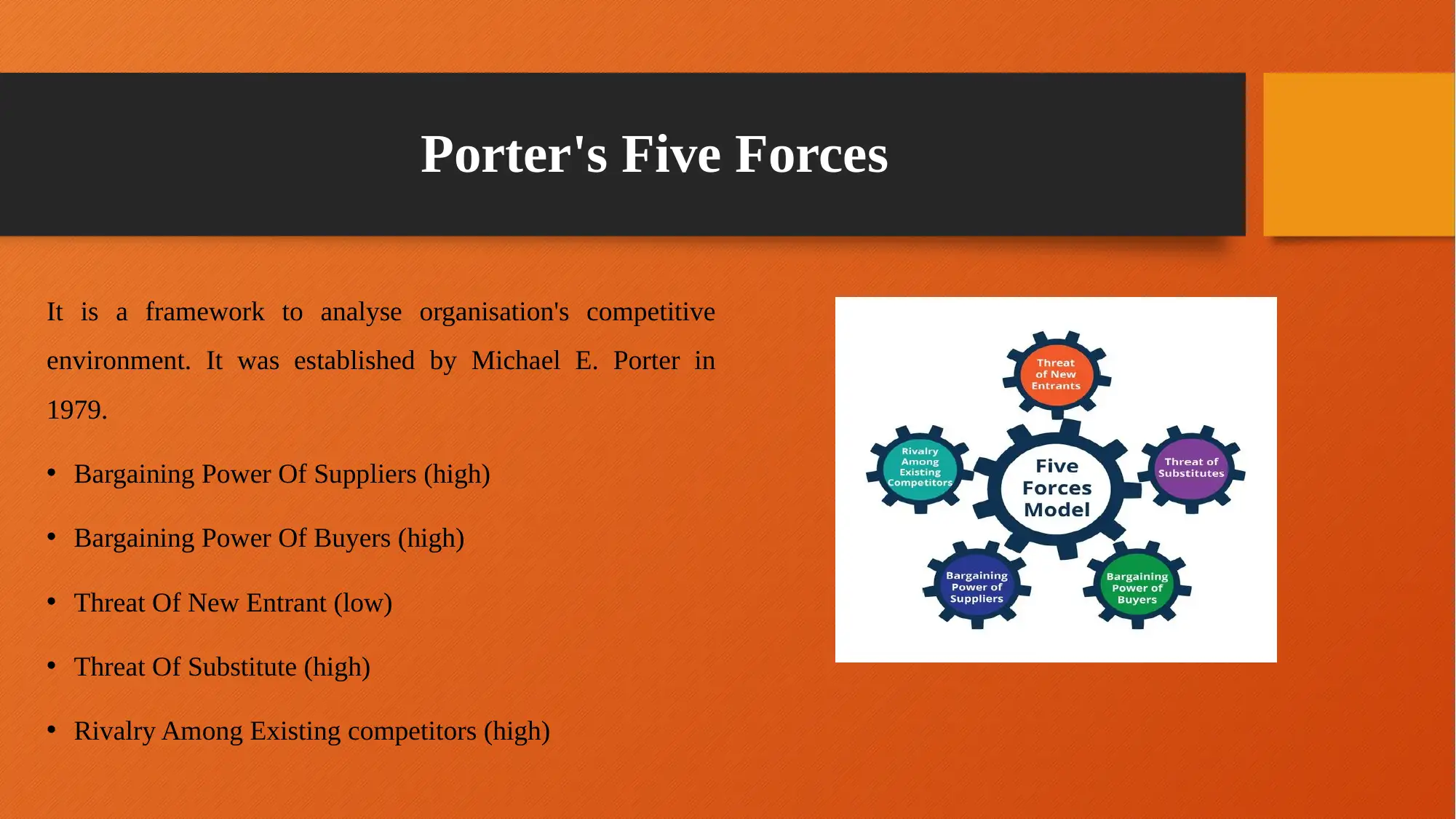
Porter's Five Forces
It is a framework to analyse organisation's competitive
environment. It was established by Michael E. Porter in
1979.
• Bargaining Power Of Suppliers (high)
• Bargaining Power Of Buyers (high)
• Threat Of New Entrant (low)
• Threat Of Substitute (high)
• Rivalry Among Existing competitors (high)
It is a framework to analyse organisation's competitive
environment. It was established by Michael E. Porter in
1979.
• Bargaining Power Of Suppliers (high)
• Bargaining Power Of Buyers (high)
• Threat Of New Entrant (low)
• Threat Of Substitute (high)
• Rivalry Among Existing competitors (high)
Paraphrase This Document
Need a fresh take? Get an instant paraphrase of this document with our AI Paraphraser
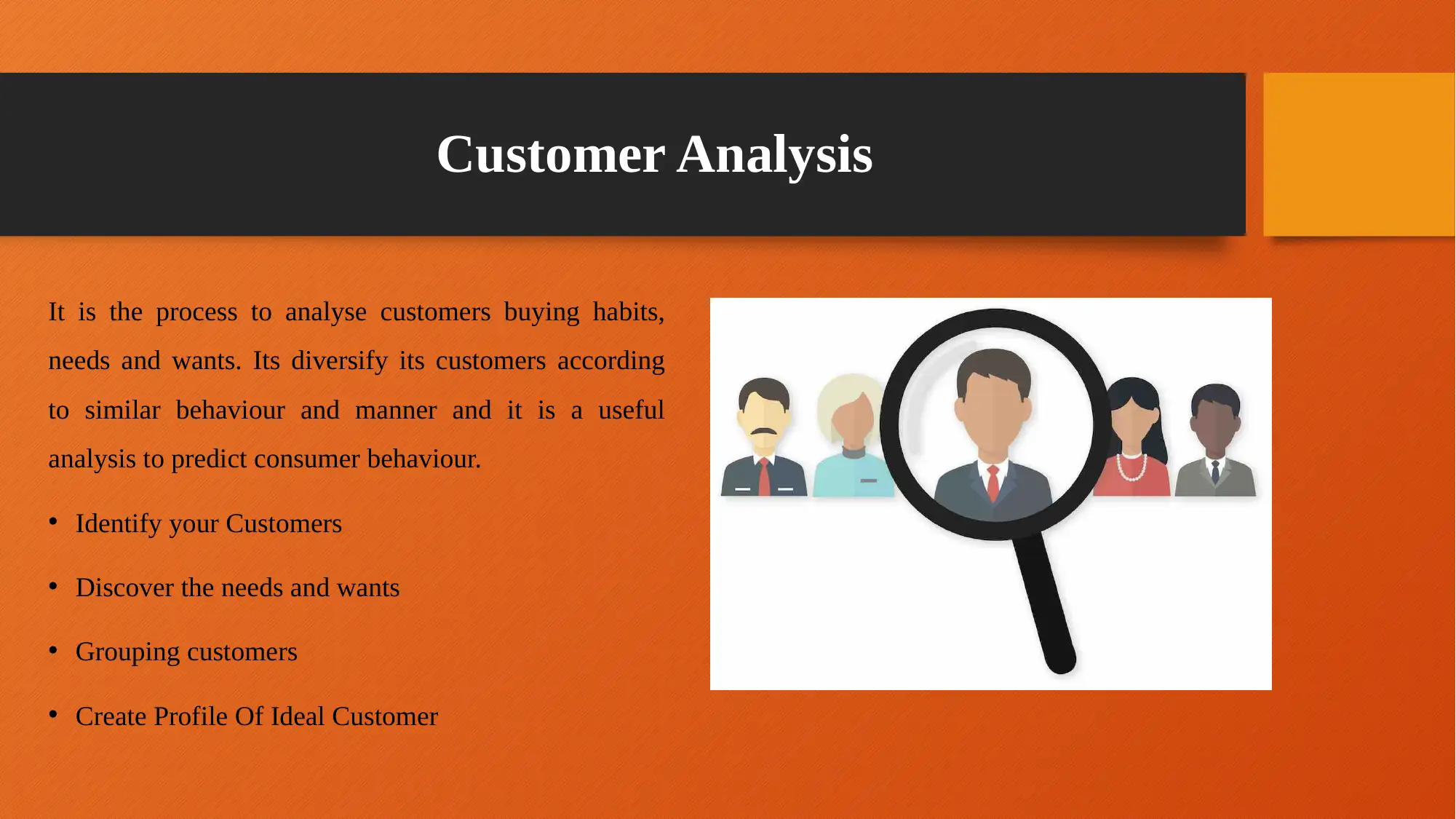
Customer Analysis
It is the process to analyse customers buying habits,
needs and wants. Its diversify its customers according
to similar behaviour and manner and it is a useful
analysis to predict consumer behaviour.
• Identify your Customers
• Discover the needs and wants
• Grouping customers
• Create Profile Of Ideal Customer
It is the process to analyse customers buying habits,
needs and wants. Its diversify its customers according
to similar behaviour and manner and it is a useful
analysis to predict consumer behaviour.
• Identify your Customers
• Discover the needs and wants
• Grouping customers
• Create Profile Of Ideal Customer
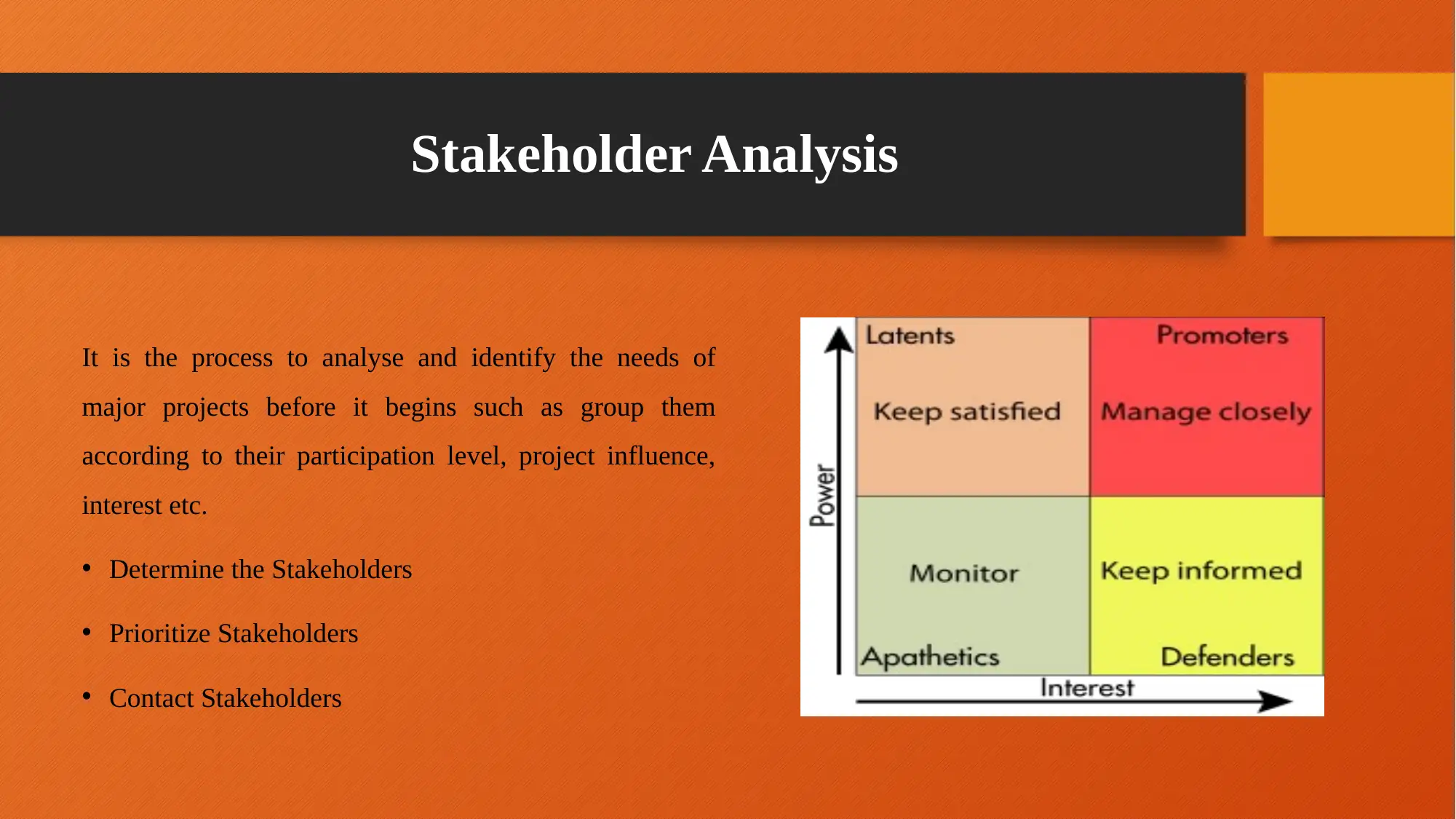
Stakeholder Analysis
It is the process to analyse and identify the needs of
major projects before it begins such as group them
according to their participation level, project influence,
interest etc.
• Determine the Stakeholders
• Prioritize Stakeholders
• Contact Stakeholders
It is the process to analyse and identify the needs of
major projects before it begins such as group them
according to their participation level, project influence,
interest etc.
• Determine the Stakeholders
• Prioritize Stakeholders
• Contact Stakeholders
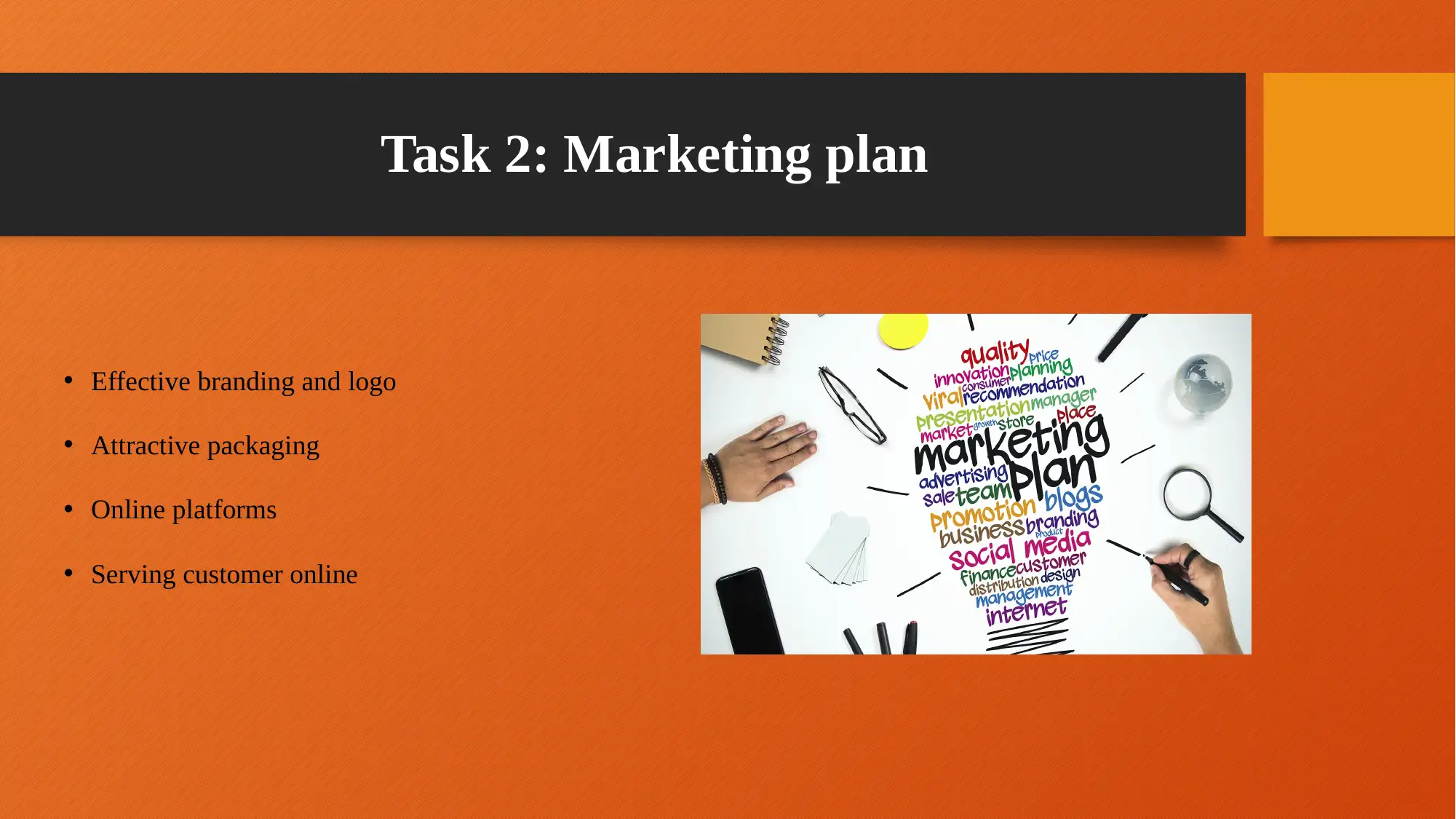
Task 2: Marketing plan
• Effective branding and logo
• Attractive packaging
• Online platforms
• Serving customer online
• Effective branding and logo
• Attractive packaging
• Online platforms
• Serving customer online
Secure Best Marks with AI Grader
Need help grading? Try our AI Grader for instant feedback on your assignments.
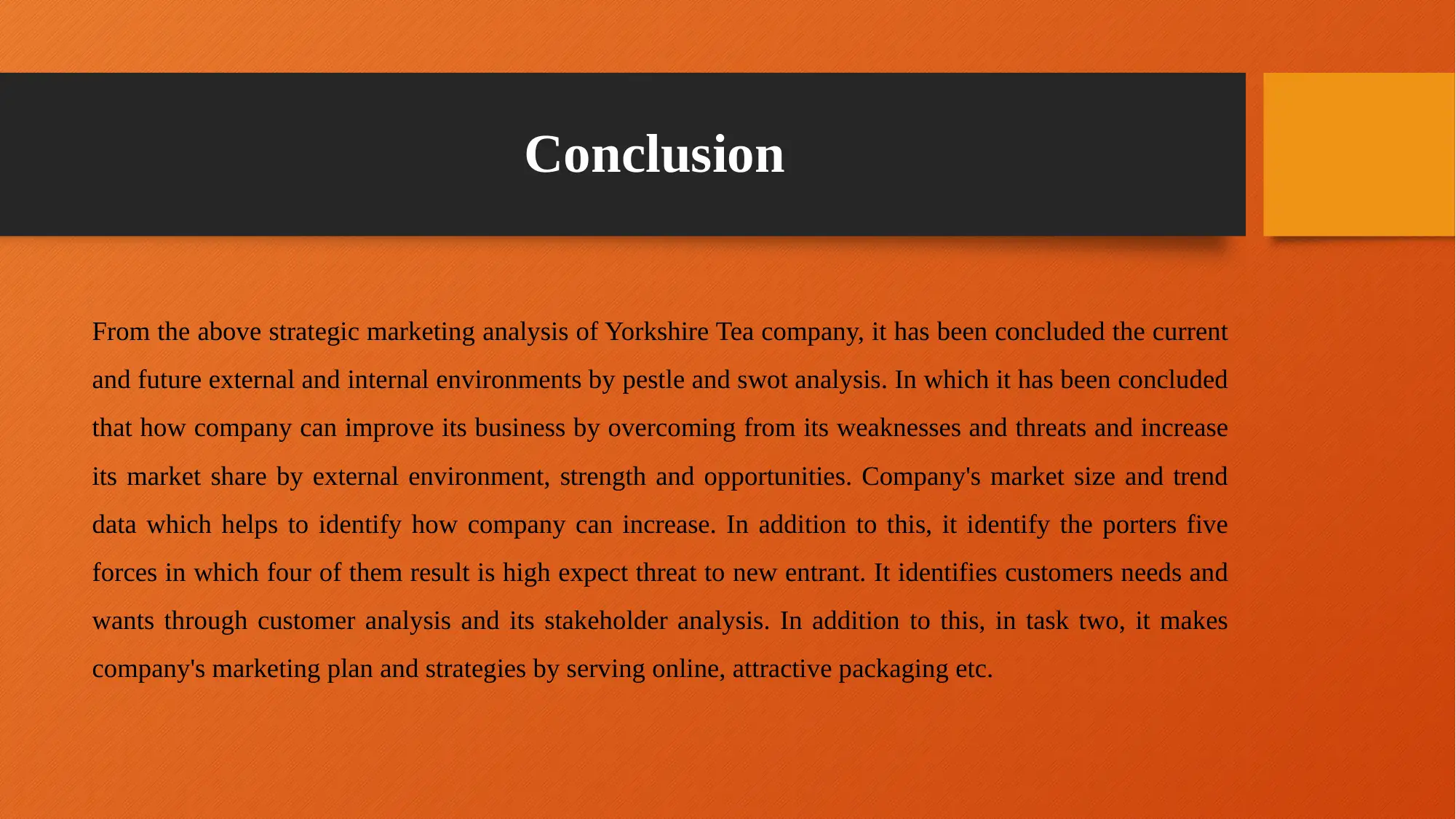
Conclusion
From the above strategic marketing analysis of Yorkshire Tea company, it has been concluded the current
and future external and internal environments by pestle and swot analysis. In which it has been concluded
that how company can improve its business by overcoming from its weaknesses and threats and increase
its market share by external environment, strength and opportunities. Company's market size and trend
data which helps to identify how company can increase. In addition to this, it identify the porters five
forces in which four of them result is high expect threat to new entrant. It identifies customers needs and
wants through customer analysis and its stakeholder analysis. In addition to this, in task two, it makes
company's marketing plan and strategies by serving online, attractive packaging etc.
From the above strategic marketing analysis of Yorkshire Tea company, it has been concluded the current
and future external and internal environments by pestle and swot analysis. In which it has been concluded
that how company can improve its business by overcoming from its weaknesses and threats and increase
its market share by external environment, strength and opportunities. Company's market size and trend
data which helps to identify how company can increase. In addition to this, it identify the porters five
forces in which four of them result is high expect threat to new entrant. It identifies customers needs and
wants through customer analysis and its stakeholder analysis. In addition to this, in task two, it makes
company's marketing plan and strategies by serving online, attractive packaging etc.
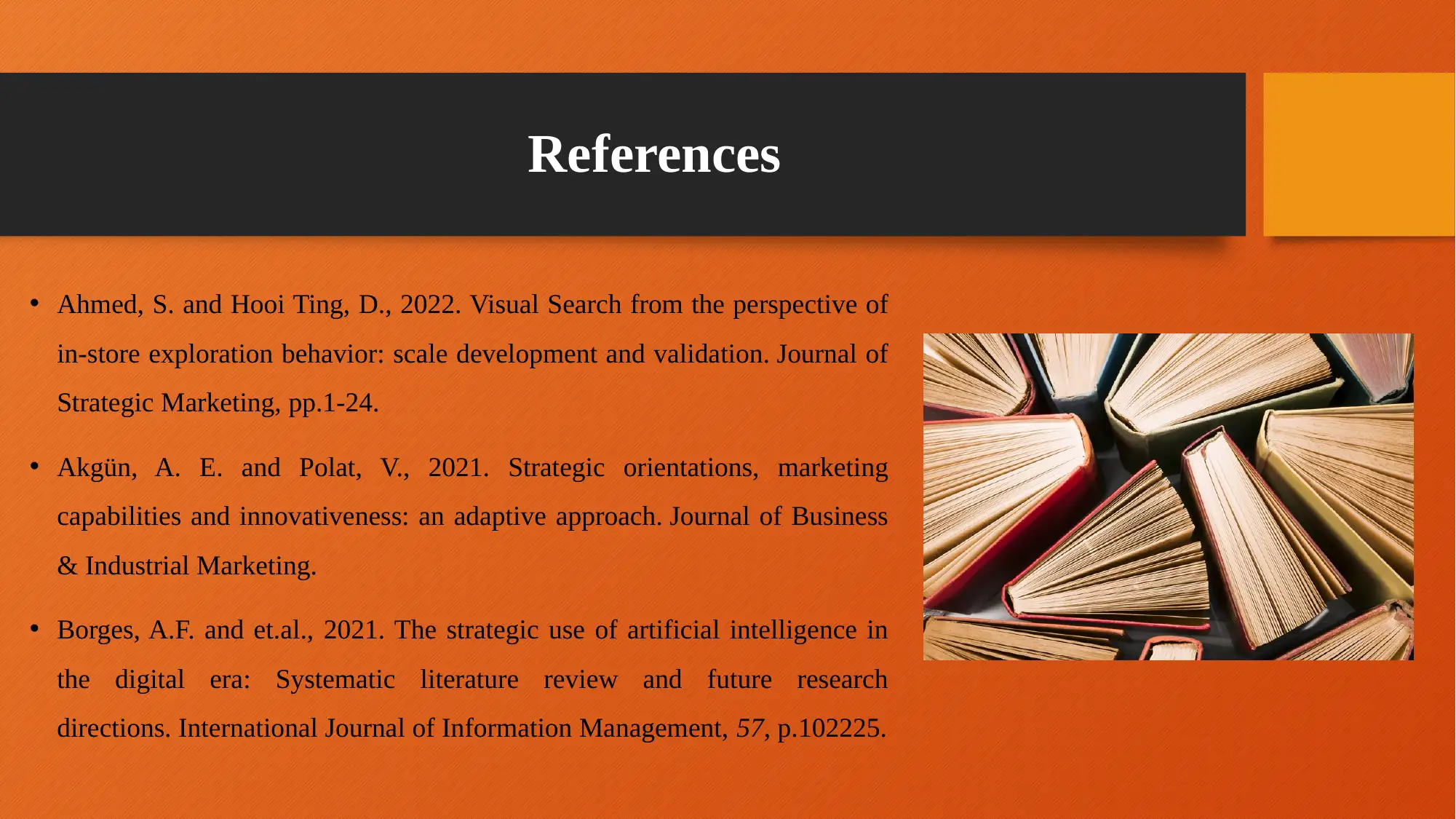
References
• Ahmed, S. and Hooi Ting, D., 2022. Visual Search from the perspective of
in-store exploration behavior: scale development and validation. Journal of
Strategic Marketing, pp.1-24.
• Akgün, A. E. and Polat, V., 2021. Strategic orientations, marketing
capabilities and innovativeness: an adaptive approach. Journal of Business
& Industrial Marketing.
• Borges, A.F. and et.al., 2021. The strategic use of artificial intelligence in
the digital era: Systematic literature review and future research
directions. International Journal of Information Management, 57, p.102225.
• Ahmed, S. and Hooi Ting, D., 2022. Visual Search from the perspective of
in-store exploration behavior: scale development and validation. Journal of
Strategic Marketing, pp.1-24.
• Akgün, A. E. and Polat, V., 2021. Strategic orientations, marketing
capabilities and innovativeness: an adaptive approach. Journal of Business
& Industrial Marketing.
• Borges, A.F. and et.al., 2021. The strategic use of artificial intelligence in
the digital era: Systematic literature review and future research
directions. International Journal of Information Management, 57, p.102225.
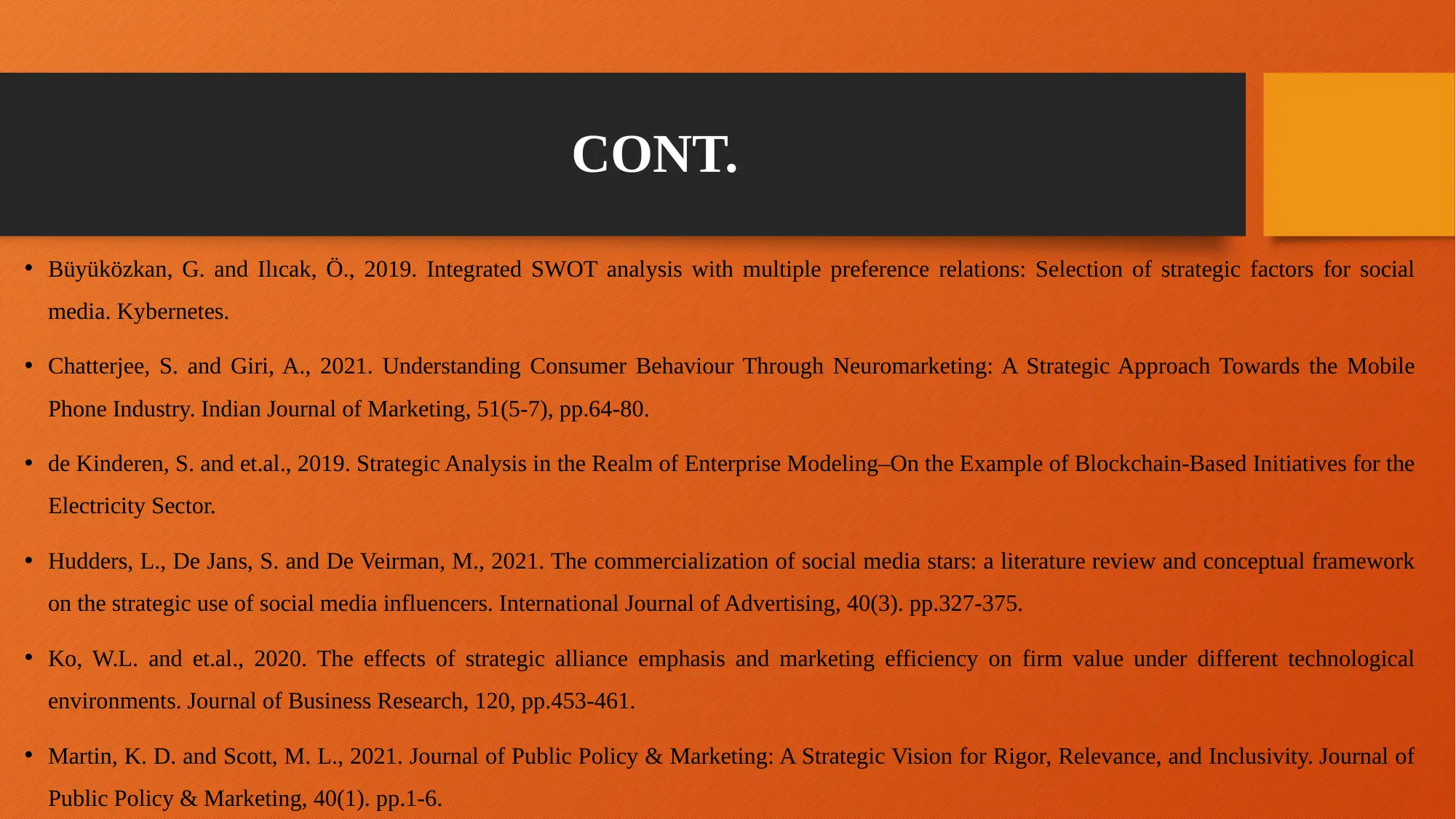
CONT.
• Büyüközkan, G. and Ilıcak, Ö., 2019. Integrated SWOT analysis with multiple preference relations: Selection of strategic factors for social
media. Kybernetes.
• Chatterjee, S. and Giri, A., 2021. Understanding Consumer Behaviour Through Neuromarketing: A Strategic Approach Towards the Mobile
Phone Industry. Indian Journal of Marketing, 51(5-7), pp.64-80.
• de Kinderen, S. and et.al., 2019. Strategic Analysis in the Realm of Enterprise Modeling–On the Example of Blockchain-Based Initiatives for the
Electricity Sector.
• Hudders, L., De Jans, S. and De Veirman, M., 2021. The commercialization of social media stars: a literature review and conceptual framework
on the strategic use of social media influencers. International Journal of Advertising, 40(3). pp.327-375.
• Ko, W.L. and et.al., 2020. The effects of strategic alliance emphasis and marketing efficiency on firm value under different technological
environments. Journal of Business Research, 120, pp.453-461.
• Martin, K. D. and Scott, M. L., 2021. Journal of Public Policy & Marketing: A Strategic Vision for Rigor, Relevance, and Inclusivity. Journal of
Public Policy & Marketing, 40(1). pp.1-6.
• Büyüközkan, G. and Ilıcak, Ö., 2019. Integrated SWOT analysis with multiple preference relations: Selection of strategic factors for social
media. Kybernetes.
• Chatterjee, S. and Giri, A., 2021. Understanding Consumer Behaviour Through Neuromarketing: A Strategic Approach Towards the Mobile
Phone Industry. Indian Journal of Marketing, 51(5-7), pp.64-80.
• de Kinderen, S. and et.al., 2019. Strategic Analysis in the Realm of Enterprise Modeling–On the Example of Blockchain-Based Initiatives for the
Electricity Sector.
• Hudders, L., De Jans, S. and De Veirman, M., 2021. The commercialization of social media stars: a literature review and conceptual framework
on the strategic use of social media influencers. International Journal of Advertising, 40(3). pp.327-375.
• Ko, W.L. and et.al., 2020. The effects of strategic alliance emphasis and marketing efficiency on firm value under different technological
environments. Journal of Business Research, 120, pp.453-461.
• Martin, K. D. and Scott, M. L., 2021. Journal of Public Policy & Marketing: A Strategic Vision for Rigor, Relevance, and Inclusivity. Journal of
Public Policy & Marketing, 40(1). pp.1-6.
Paraphrase This Document
Need a fresh take? Get an instant paraphrase of this document with our AI Paraphraser
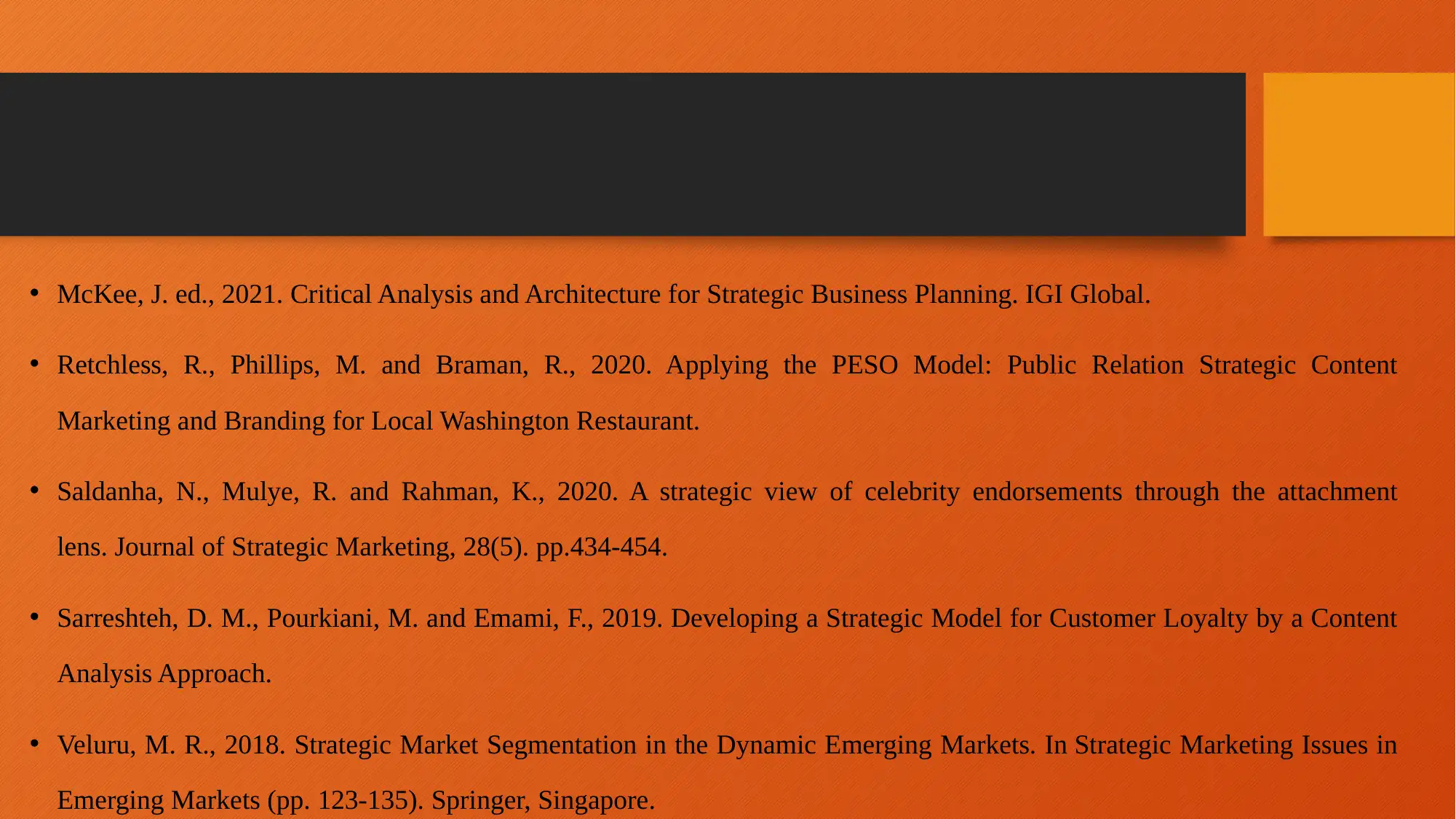
• McKee, J. ed., 2021. Critical Analysis and Architecture for Strategic Business Planning. IGI Global.
• Retchless, R., Phillips, M. and Braman, R., 2020. Applying the PESO Model: Public Relation Strategic Content
Marketing and Branding for Local Washington Restaurant.
• Saldanha, N., Mulye, R. and Rahman, K., 2020. A strategic view of celebrity endorsements through the attachment
lens. Journal of Strategic Marketing, 28(5). pp.434-454.
• Sarreshteh, D. M., Pourkiani, M. and Emami, F., 2019. Developing a Strategic Model for Customer Loyalty by a Content
Analysis Approach.
• Veluru, M. R., 2018. Strategic Market Segmentation in the Dynamic Emerging Markets. In Strategic Marketing Issues in
Emerging Markets (pp. 123-135). Springer, Singapore.
• Retchless, R., Phillips, M. and Braman, R., 2020. Applying the PESO Model: Public Relation Strategic Content
Marketing and Branding for Local Washington Restaurant.
• Saldanha, N., Mulye, R. and Rahman, K., 2020. A strategic view of celebrity endorsements through the attachment
lens. Journal of Strategic Marketing, 28(5). pp.434-454.
• Sarreshteh, D. M., Pourkiani, M. and Emami, F., 2019. Developing a Strategic Model for Customer Loyalty by a Content
Analysis Approach.
• Veluru, M. R., 2018. Strategic Market Segmentation in the Dynamic Emerging Markets. In Strategic Marketing Issues in
Emerging Markets (pp. 123-135). Springer, Singapore.

1 out of 15
Related Documents
Your All-in-One AI-Powered Toolkit for Academic Success.
+13062052269
info@desklib.com
Available 24*7 on WhatsApp / Email
![[object Object]](/_next/static/media/star-bottom.7253800d.svg)
Unlock your academic potential
© 2024 | Zucol Services PVT LTD | All rights reserved.





